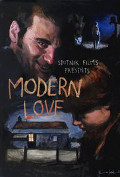
Directed by
Alex Frayne
95 minutes
Rated G
Reviewed by
Bernard Hemingway

Modern Love
Synopsis: John (Mark Constable), his wife (Victoria Hill) and son (William Traeger) travel to a South Australian seaside town for the funeral of John’s Uncle Tom. Apparently a death by suicide, John does not believe it and his behaviour grows increasingly strange as he tries to find out what really happened.Modern Love is an ambitious first feature that is principally oriented towards the psychological dimensions of the horror film. In this respect it strikingly explores the mental breakdown of its main character, John, skilfully overlaying and distorting the generic narrative structure with an increasingly delusional subjectivity brought home to the audience via a mix of eidetically-heightened imagery and an insistently discomfiting sound design. As an aesthetic strategy this is both bold and innovative although there is tendency to overwhelm the substance of the story with an abundance of formal embellishment, leaving the makers open to a charge of self-indulgence and lack of dramatic focus.
The film opens with a compelling sequence that sets out what is clearly the pivotal event of the film. An old man, out duck-hunting, is shot, whether by himself or someone else. This is captured in other-worldly, sepia tonalities from what seems to be a hidden observer’s perspective. We then cut to John’s typical suburban home - all blue sky and clean, high-toned colours seen from a conventional front-on perspective. This visual contrast represents the emotional axis along which the story evolves as the light-filled present is gradually swallowed by the dark past.
This aspect of the film is handled with notable skill, the photography, editing and sound design combining effectively to take us into John’s derangement. The problem however is in accounting dramatically for the source and, then subsequent spiralling out, of the derangement. Here it as if the makers have been so involved in creating a filmic analogy for their subject’s mental breakdown that they have not paid enough attention to some of the basic elements of narrative construction. I could not help but think of The Shining (1980) a film with which it would not surprise me if Frayne and writer/DOP Nick Matthews were very familiar. But where Kubrick (and Stephen King) gave us a very clearly comprehensible, albeit conventional, tale of demonic possession, what is going on in Modern Love is anything but clear. This obscurity may earn the makers some credit as rule-benders but more likely it has deprived their audience of a good deal of satisfaction .
For much of the film the inference that might be drawn from events is that John and his brother, Dan, were victims of sexual abuse (perhaps ironically alluded to in the film’s enigmatic title) and that John’s breakdown is the consequence of a long-repressed identification with the now-dead abuser, the “horror” being the distorted but overwhelming sense of guilt that he has felt ever since abandoning him. However in the film’s histrionic latter stages, the notion of “a curse” is invoked with The Exorcist-like eye-rolling on the part of John’s son, the appearance of John’s weirdo parents, John’s wife’s blood being splattered on walls, voices from beyond the grave and his brother Dan gorging himself on a can of baked beans. The first option, with its more intelligent, resonant implications, is not carried through and the second is a rather incongruous style-crunching shift of tone that falls back on standard horror genre conventions probably a little too late to convince those who like such things. What thus was for the most part a skilled exploration of human tragedy ends as a grab-bag of over-familiar genre devices.
If a clearer focus and more rigorous editing would have helped to broaden its appeal, Modern Love certainly bespeaks the presence of a group of talented individuals who no doubt will return with their skills honed. And by the way, stick around for the delightful end-titles by Stephen Venner.

Want more about this film?


Want something different?




